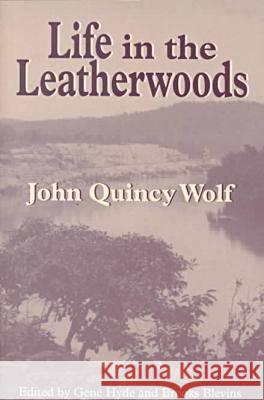Life in the Leatherwoods: New Edition » książka
Life in the Leatherwoods: New Edition
ISBN-13: 9781557285942 / Angielski / Miękka / 2000 / 219 str.
"Life in the Leatherwoods" is one of the country's most delightful childhood memoirs, penned by an Ozark native with a keen, observant eye and a gift for narrative. John Quincy Wolf's relaxed style and colorful characters resemble those of another chronicler of nineteenth-century rural life, Laura Ingalls Wilder. Wolf's acerbic wit and lucid prose infuse the White River pioneers of his story with such life that the reader participates vicariously in their log rollings, house-raisings, spelling bees, hog killings, soap making, country dances, and camp meetings. Originally published by Memphis State University Press in 1974, this new edition includes additional writings of John Q. Wolf and a continuation of the autobiographical narrative after his 1887 move to Batesville. Wolf's writings are valuable resources for southern historians, folklorists, general readers, and scholars of Ozarkiana because they provide a rare glimpse into the social and family life of a largely misunderstood and stereotyped people the independent hill farmers of the Arkansas Ozarks of the 1870s and 1880s. With Life in the Leatherwoods, Wolf bestows a benediction upon a society that existed vibrantly and humorously in his memory one that has now forever disappeared from the American countryside.
Originally published by Memphis State University Press in 1974, this new edition includes additional writings of John Q. Wolf and a continuation of the autobiographical narrative after his 1887 move to Batesville. Wolf s writings are valuable resources for southern historians, folklorists, general readers, and scholars of Ozarkiana because they provide a rare glimpse into the social and family life of a largely misunderstood and stereotyped people the independent hill farmers of the Arkansas Ozarks of the 1870s and 1880s. With "Life in the Leatherwoods," Wolf bestows a benediction upon a society that existed vibrantly and humorously in his memory one that has now forever disappeared from the American countryside."











